#congress for the new urbanism
Text
A great article from @cnu-newurbanism !
2 notes
·
View notes
Text
AN OPEN LETTER to THE PRESIDENT & U.S. CONGRESS; STATE GOVERNORS & LEGISLATURES
Act Now: Save Public Transit from Extinction!
2 so far! Help us get to 5 signers!
I am writing to highlight the critical state of public transit in the United States and urge your support increased investment in this essential service. The challenges facing public transit—under-investment, over-reliance on car ownership, and racial disparities—have been exacerbated by the COVID-19 pandemic. It is imperative that we take bold action to address these issues for the benefit of our communities and our future.
Investing in public transit is not merely a matter of convenience; it is a necessity for tackling climate change, advancing equity, supporting essential workers, and fostering economic recovery. The largest source of carbon emissions in the U.S. stems from transportation, and increased investment in public transit can significantly reduce this impact. Furthermore, public transit plays a crucial role in providing equitable access to jobs, schools, and services, especially for those who cannot afford or do not have access to private vehicles.
With over 2.8 million essential workers relying on public transit, our pandemic response and economic recovery hinge on the strength and viability of our transit systems. According to studies, sustained investment in public transportation yields substantial economic returns, with every $1 billion invested annually resulting in approximately $5 billion in additional GDP.
I commend initiatives like the Green New Deal for Transportation and efforts by organizations such as the CHARGE coalition to electrify and expand public transportation. These initiatives are pivotal in shaping a more sustainable and equitable transportation system for all Americans.
Therefore, I urge you to support emergency relief funding for public transit and join the movement to rebuild and improve our public transit system. This is not just an investment in infrastructure; it is an investment in our collective future.
Thank you for your attention to this urgent matter. I look forward to your support in advancing policies that will ensure a robust and accessible public transit system for all.
📱 Text SIGN PZHBAF to 50409
🤯 Liked it? Text FOLLOW IVYPETITIONS to 50409
💘 Q'u lach' shughu deshni da.
🏹 "What I say is true" in Dena'ina Qenaga
#ivypetitions#PZHBAF#resistbot#walkable cities#no cars#public transport#Public Transit#Transportation#Infrastructure#Equity#Climate Change#Essential Workers#Economic Recovery#Green New Deal#Sustainability#Community Access#Environmental Impact#Racial Justice#Urban Mobility#Public Transportation#Advocacy#Investment#Congress#Government#Policy#Legislation#COVID-19 Response#Public Health#Environmental Justice#Social Equity
6 notes
·
View notes
Text
Urban Design Hot Take
Stop watching/reading/whatevering stuff and start to go outside and ask yourself what do you like? Then draw it down, write it, take pictures, whatever you gets it in your head. Everything from "I like that tree specifically" to "this street is comfortable to walk in because the cars are far away"
Do the same for the stuff you don't like, but ask two question. Is this inconvenience in service of another user? And what would this look like for me to like it?
Then go to the planning board meeting
(You should still read/watch stuff, just that paying attention to your environment is the best practice for the stuff you learn by reading/watching)
#urban landscape#urban design#congress for new urbanism#landscape sketch#sketching#look at the world around yoi#landscape architecture#architecture#urban planning#street design#street scape
3 notes
·
View notes
Text
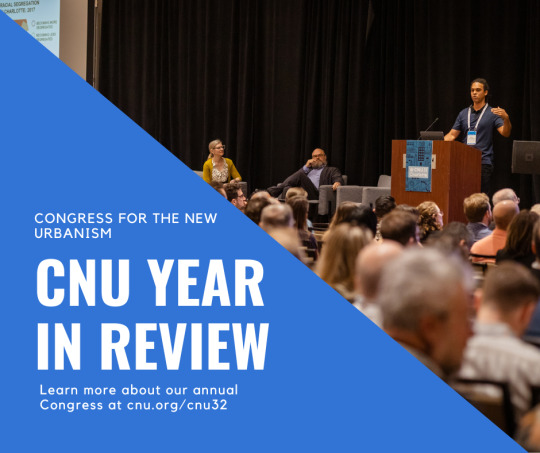
Thank you to the over 1350 #NewUrbanists who joined us for #CNU31 in Charlotte where we launched our Congress rethink process and introduced the annual Congress Focus.
Support our annual Congress and receive a limited edition t-shirt while supplies last: members.cnu.org/giving_2023
1 note
·
View note
Text
What Joe Biden has Done for LGBTQ+ People
I wanted to list out everything The Biden Administration has done for Queer people in the last 3 and a half years, but according to GLAAD it'd been 337 moves (and I noticed they missed a few things...) there was just no way to list every ground breaking first Queer person ever nominated to fill this or that job, every ally with a historic LGBT rights record nominated for a top job, every beautiful statement of support, every time he tried to get Congress to pass the Equality Act (support it!) So I've gone through and done my best to pick the ones I think were the most important, but everyone should check out the full list!

Day 1: Signs executive orders banning discrimination and ordering a full review of all federal agencies policies to better include and support LGBT people
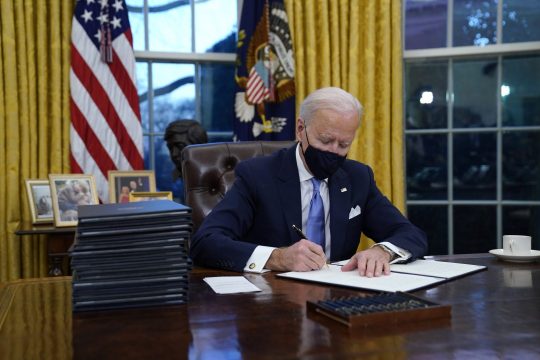
Pete Buttigieg becomes the first openly gay person nominated and confirmed for a cabinet level post as Secretary of Transportation
Revokes Trump’s 2018 ban on transgender military personnel
Department of Housing and Urban Development implements LGBTQ protections in housing, becoming first federal agency to implement Pres. Biden’s executive order
First President to recognize and proclaim Trans Day of Visibility
Department of Justice Civil Rights Division issues an official memo that the Supreme Court's Bostock decision against LGBT workplace discrimination also applies to education through Title IX
HUD withdraws a Trump Administration proposed rule change, and reaffirms trans people's rights to seek shelters matching their gender identity
HHS announces the withdrawal of Trump Administration rules that allowed discrimination by healthcare organizations against LGBT people.
The State Department and later Homeland Security announce babies born to Queer couples overseas will be American citizens if one parent is American, in the past the child only qualified if they were genetically related to the American citizen parent.
The Justice Department files against a West Virginia law banning trans students from school athletics
Department of Veterans Affairs announces it will offer gender confirming surgery for transgender veterans. There are an estimated 134,000 transgender veterans in the U.S. and another 15,000 transgender people serving in the armed forces.
President Biden Signs a law making the Pulse Night Club a national memorial
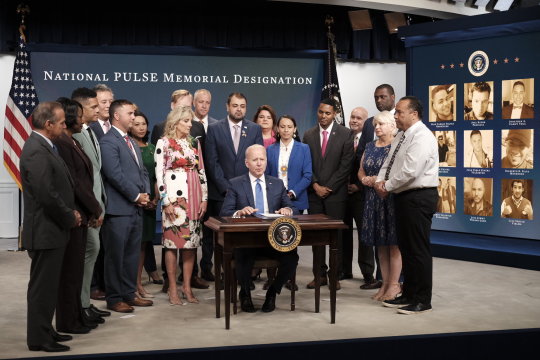
The State Department creates an X gender marker for passports and other documents, allowing gender affirming identification for non-binary and intersex people for the first time.
The Census Bureau for the first time issues a Survey with questions about sexual orientation and gender identity
On the 10th anniversary of the repeal of Don’t Ask Don’t Tell, Veterans Administration announces that soldiers discharged for homosexual conduct, gender identity or HIV status qualify for veterans' benefits
Dr. Rachel Levine becomes the first trans person confirmed by the US Senate when she was nominated to be Assistant Secretary for Health, she also became the first trans flag rank officer when she was sworn in as a 4 star Admiral for her job as head of the Public Health Service Commissioned Corps, his makes her the highest ranked trans person in government

Holds the first ever vigil in the White House for Transgender Day of Remembrance
HHS announces rule change to reinstate and expand protections against discrimination in the Affordable Care Act, including denying coverage for gender-affirming care.
Social Security Administration reverses a Trump Administration policy and allows benefits claims by surviving partners in same-sex relationships, whose partner died before marriage equality was legal
President Biden signs the reauthorization of the Violence Against Women Act (a bill he helped originally craft in the Senate) which for the first time has grant programs dedicated to expanding and developing initiatives specifically for LGBTQ survivors of domestic violence
The TSA announces new technology and policy shifts to improve the customer experience of transgender travelers who have previously been required to undergo additional screening due to alarms in sensitive areas.
The Social Security Administration allows people to edit their gender and name on records for the first time without legal and medical documentation
The US Air Force announces it'll offer medical and legal aid to any personnel families affected by state level anti-trans youth bills.
Karine Jean-Pierre becomes the first Lesbian to serve as White House Press Secretary

on 50th anniversary of Title IX The Department of Ed strengthens protections for Students against sexual harassment and discrimination
Veterans Affairs announces survivor benefits now extended to partners from relationships before marriage equality was legalized in 2015
President Biden signs the Respect for Marriage Act into law enshrining protections for marriage equality for same-sex and interracial couples
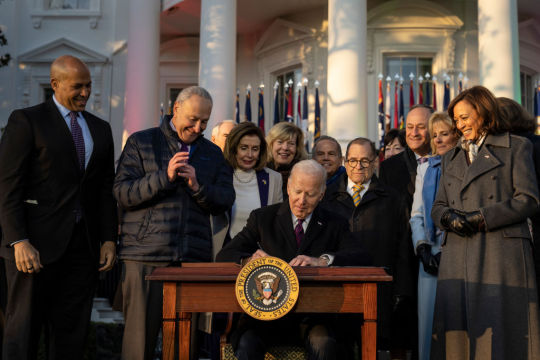
The Department of Ed announces new rules around athletic eligibility under Title IX, declaring blanket bans on trans students violate the law and setting up strike standards for schools
The White House announced a suit of new protections for LGBTQ people, including a new job at the Department of Ed to combat book bans, a joint DoJ Homeland Security effort to combat violence and threats and HHS evidence-based guidance to mental health providers for care of transgender kids
President Biden signs an Executive Order directing HHS to protect LGBTQI+ youth in the foster care system, a rule they later passed requiring Queer foster children to be placed in affirming homes
The Biden administration joins families of transgender youth in Tennessee and Kentucky in petitioning the U.S. Supreme Court to review and reverse a circuit court ruling allowing a ban on mainstream health care to be enforced
President Biden Signs a EO expanding on past EO on equality and helping underserved communities
The Department of Education's Civil Rights office opens an investigation into the death of Nex Benedict. President Biden in his statement said: "Every young person deserves to have the fundamental right and freedom to be who they are, and feel safe and supported at school and in their communities. Nex Benedict, a kid who just wanted to be accepted, should still be here with us today. Nonbinary and transgender people are some of the bravest Americans I know. But nobody should have to be brave just to be themselves. In memory of Nex, we must all recommit to our work to end discrimination and address the suicide crisis impacting too many nonbinary and transgender children.”
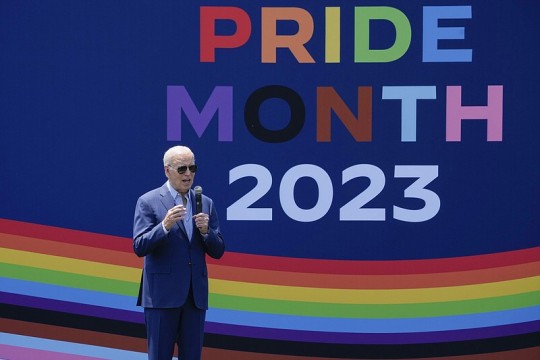
#Joe Biden#Thanks Biden#pride#pride month#politics#US politics#LGBT#LGBTQ#Queer#Trans#gay#civil rights#there's a lot more
2K notes
·
View notes
Text
In 1833, Parliament finally abolished slavery in the British Caribbean, and the taxpayer payout of £20 million in “compensation” [paid by the government to slave owners] built the material, geophysical (railways, mines, factories), and imperial infrastructures of Britain [...]. Slavery and industrialization were tied by the various afterlives of slavery in the form of indentured and carceral labor that continued to enrich new emergent industrial powers [...]. Enslaved “free” African Americans predominately mined coal in the corporate use of black power or the new “industrial slavery,” [...]. The labor of the coffee - the carceral penance of the rock pile, “breaking rocks out here and keeping on the chain gang” (Nina Simone, Work Song, 1966), laying iron on the railroads - is the carceral future mobilized at plantation’s end (or the “nonevent” of emancipation). [...] [T]he racial circumscription of slavery predates and prepares the material ground for Europe and the Americas in terms of both nation and empire building - and continues to sustain it.
Text by: Kathryn Yusoff. "White Utopia/Black Inferno: Life on a Geologic Spike". e-flux Journal Issue #97. February 2019.
---
When the Haitian Revolution erupted [...], slaveholding regimes around the world grew alarmed. In response to a series of slave rebellions in its own sugar colonies, especially in Jamaica, the British Empire formally abolished slavery in the 1830s. [...] Importing indentured labor from Asia emerged as a potential way to maintain the British Empire’s sugar plantation system. In 1838 John Gladstone, father of future prime minister William E. Gladstone, arranged for the shipment of 396 South Asian workers, bound to five years of indentured labor, to his sugar estates in British Guiana. The experiment [...] inaugurated [...] "a new system of [...] [indentured servitude]," which would endure for nearly a century. [...] Desperate to regain power and authority after the war [and abolition of chattel slavery in the US], Louisiana’s wealthiest planters studied and learned from their Caribbean counterparts. [...] Thousands of Chinese workers landed in Louisiana between 1866 and 1870, recruited from the Caribbean, China and California. [...] When Congress debated excluding the Chinese from the United States in 1882, Rep. Horace F. Page of California argued that the United States could not allow the entry of “millions of cooly slaves and serfs.”
Text by: Moon-Ho Jung. "Making sugar, making 'coolies': Chinese laborers toiled alongside Black workers on 19th-century Louisiana plantations". The Conversation. 13 January 2022.
---
The durability and extensibility of plantations [...] have been tracked most especially in the contemporary United States’ prison archipelago and segregated urban areas [...], [including] “skewed life chances, limited access to health [...], premature death, incarceration [...]”. [...] [In labor arrangements there exists] a moral tie that indefinitely indebts the laborers to their master, [...] the main mechanisms reproducing the plantation system long after the abolition of slavery [...]. [G]enealogies of labor management […] have been traced […] linking different features of plantations to later economic enterprises, such as factories […] or diamond mines […] [,] chartered companies, free ports, dependencies, trusteeships [...].
Text by: Irene Peano, Marta Macedo, and Colette Le Petitcorps. "Introduction: Viewing Plantations at the Intersection of Political Ecologies and Multiple Space-Times". Global Plantations in the Modern World: Sovereignties, Ecologies, Afterlives (edited by Petitcrops, Macedo, and Peano). Published 2023.
---
Louis-Napoleon, still serving in the capacity of president of the [French] republic, threw his weight behind […] the exile of criminals as well as political dissidents. “It seems possible to me,” he declared near the end of 1850, “to render the punishment of hard labor more efficient, more moralizing, less expensive […], by using it to advance French colonization.” [...] Slavery had just been abolished in the French Empire [...]. If slavery were at an end, then the crucial question facing the colony was that of finding an alternative source of labor. During the period of the early penal colony we see this search for new slaves, not only in French Guiana, but also throughout [other European] colonies built on the plantation model.
Text by: Peter Redfield. Space in the Tropics: From Convicts to Rockets in French Guiana. 2000.
---
To control the desperate and the jobless, the authorities passed harsh new laws, a legislative program designed to quell disorder and ensure a pliant workforce for the factories. The Riot Act banned public disorder; the Combination Act made trade unions illegal; the Workhouse Act forced the poor to work; the Vagrancy Act turned joblessness into a crime. Eventually, over 220 offences could attract capital punishment - or, indeed, transportation. […] [C]onvict transportation - a system in which prisoners toiled without pay under military discipline - replicated many of the worst cruelties of slavery. […] Middle-class anti-slavery activists expressed little sympathy for Britain’s ragged and desperate, holding […] [them] responsible for their own misery. The men and women of London’s slums weren’t slaves. They were free individuals - and if they chose criminality, […] they brought their punishment on themselves. That was how Phillip [commander of the British First Fleet settlement in Australia] could decry chattel slavery while simultaneously relying on unfree labour from convicts. The experience of John Moseley, one of the eleven people of colour on the First Fleet, illustrates how, in the Australian settlement, a rhetoric of liberty accompanied a new kind of bondage. [Moseley was Black and had been a slave at a plantation in America before escaping to Britain, where he was charged with a crime and shipped to do convict labor in Australia.] […] The eventual commutation of a capital sentence to transportation meant that armed guards marched a black ex-slave, chained once more by the neck and ankles, to the Scarborough, on which he sailed to New South Wales. […] For John Moseley, the “free land” of New South Wales brought only a replication of that captivity he’d endured in Virginia. His experience was not unique. […] [T]hroughout the settlement, the old strode in, disguised as the new. [...] In the context of that widespread enthusiasm [in Australia] for the [American] South (the welcome extended to the Confederate ship Shenandoah in Melbourne in 1865 led one of its officers to conclude “the heart of colonial Britain was in our cause”), Queenslanders dreamed of building a “second Louisiana”. [...] The men did not merely adopt a lifestyle associated with New World slavery. They also relied on its techniques and its personnel. [...] Hope, for instance, acquired his sugar plants from the old slaver Thomas Scott. He hired supervisors from Jamaica and Barbados, looking for those with experience driving plantation slaves. [...] The Royal Navy’s Commander George Palmer described Lewin’s vessels as “fitted up precisely like an African slaver [...]".
Text by: Jeff Sparrow. “Friday essay: a slave state - how blackbirding in colonial Australia created a legacy of racism.” The Conversation. 4 August 2022.
#abolition#tidalectics#multispecies#ecology#intimacies of four continents#ecologies#confinement mobility borders escape etc#homeless housing precarity etc#plantation afterlives#archipelagic thinking
208 notes
·
View notes
Note
Hello!
I'm not sure if this is a bit odd to ask, but I saw your post about living in rural arkansas as a teen- and the note at the end about gun rights, and how rifles are different than handguns in that legislation and all-
do you have any sources you could link so I can look into that more? I live in rural Kentucky so hunting is very ingrained into just how me and my family and our neighbors live. (also a poor county- I didn't actually know other cities had kids pay for their lunch because I was so used to everyone in my county getting a free lunch- it seems like such a basic thing).
I've never heard anyone mention not banning hunting rifles when they talk about banning guns-
The gun bans being asked for are assault rifles and semi-automatic pistols. Rapid-fire guns intended for military use against multiple human targets - not hunting rifles at all, and not the kinds of pistols that are good for self-defense. (...Not that pistols are good for self-defense in general. Shotguns are good for self-defense. Nobody's trying to ban shotguns.)
The NRA is invested in convincing hunting-rifle owners and pistol owners that the various proposed weapons bans are aimed at them, and not at the tiny number of people who want the ability to shoot up a whole bar or classroom in under a minute.
The NRA has also fought hard against any kind of gun safety requirements.
Bill from last year to ban/restrict assault rifles:
https://www.congress.gov/bill/118th-congress/senate-bill/25/text
The gun safety bill Biden recently signed:
Doesn't ban any weapons. Puts restrictions on who can get weapons - people convicted of most types of domestic partner violence will not be allowed to buy guns. It makes it harder for people under 21 to buy guns. It closes some loopholes about selling guns, so sellers will need to be registered and licensed. Sets up new funding for gun crisis intervention.
Doesn't do anything to restrict hunting, other than possibly adding to the bureaucracy for people under 21 getting new guns.
Most people in urban areas are oblivious to hunting as a Real Thing that People Actually Do For Good Reasons, rather than a kind of cruel sporting event. They are vaguely aware that hunting rifles are not assault rifles, are not semi-automatics, but only as an abstract concept. Might or might not be able to tell a hunting rifle apart from a semi-automatic if they saw them. (I am not sure I could; I am very much not a gun person.) (I have shot one gun, once in my life. It was loud and hurt my hand and I had no interest in doing it again.)
I don't know how much I think we need to ban or restrict certain weapons. I am absolutely certain we need to keep certain weapons out of the hands of certain people, because the current system of "I guess 10-year-olds should all get training on what to do if some teacher's ex-boyfriend decides to shoot up the school" is ridiculous.
Given how hard it is to identify the "certain people" who should damn well NOT have access to automatic weapons, I'm okay with "it gets harder for anyone to get them," because I don't see how heavy assault rifles are a "but I neeeeed it this weekend!" kind of thing. (Not sure I see that hunting rifles are a "need it now" kind of thing, either; seems like those are a hefty enough purchase that the buyer should be doing some planning in advance. So filing for it like you would for car registration - another expensive piece of tech that kills people if you use it wrong - shouldn't be too big a burden.)
The idiots who include hunting rifles in their talk about banning guns - I won't say there aren't any; all sorts of politics gets plenty of idiots - have no idea how those guns actually get used. And the people writing actual policies and trying to get the laws changed are not those idiots.
The "ban guns" movement has two main parts:
Remove general access to guns that can kill a dozen people in under a minute, and
Remove gun access from specific people who have a history of getting angry and violent, especially those who have a history of shooting other people when they're angry and violent.
Side note: Some of us want that second point to include cops. That faction is getting nowhere.
None of it is trying to remove access to hunting rifles or reduce the amount of hunting in places that need it. (Basically, all of the South; I am near San Francisco and nobody anywhere near me "needs" to hunt; I don't care what they do with hunting rights in the greater SF Bay Area).
The focus is on preventing gun violence, not preventing gun use. And that means restricting access to guns that have no purpose other than anti-human violence, and restricting access to all guns from people who are likely to use them as weapons instead of tools.
53 notes
·
View notes
Text
A Minnesotan Sizes Up Tim Walz
During his tenure, student achievement has slipped, crime has surged, and state residents have fled.
By Scott W. Johnson - Wall Street Journal
St. Paul, Minn.
Tim Walz has such a bad record as Minnesota’s governor that I was astonished when he landed on Vice President Kamala Harris’s vice-presidential shortlist. As Minnesota’s Center of the American Experiment has documented, under Mr. Walz Minnesota has become a high-crime state. Student achievement has tumbled as spending on schools has skyrocketed. Per capita gross domestic product has fallen below the national average. Minnesotans have joined residents of New York, California and Illinois in fleeing their home state.
Pennsylvania Gov. Josh Shapiro—also on Ms. Harris’s shortlist—made sense to me. Pennsylvania is a key state. Mr. Shapiro seems to be a man of substance and would give liberal Jews a reason to vote for Ms. Harris without a guilty conscience. As a Jewish supporter of Israel, I worried that Mr. Shapiro would give the animus throbbing in the heart of the Democratic Party cover. Indeed, that animus drove a nasty intraparty campaign against him.
But Tim Walz? I’m a conservative Republican. I don’t completely understand Democrats’ ways. As an observer of Minnesota politics, however, I understand how Mr. Walz became governor. Having served six terms in Congress from a rural district, he challenged the endorsed DFL (Democratic-Farmer-Labor Party) candidate—a liberal metro-area state senator, Erin Murphy—in the 2018 DFL primary. Ms. Murphy was also challenged by another metro-area liberal, Lori Swanson, then state attorney general. With Ms. Murphy and Ms. Swanson dividing the liberal urban vote, Mr. Walz and his far-left running mate, former state Rep. Peggy Flanagan, won the primary with 41%.
On taking office in 2019, Gov. Walz was restrained by a one-seat Republican majority in the state Senate—until Covid hit in the spring of 2020. He declared a state of emergency on March 25, 2020, and ruled by decree for 15 months. He proclaimed the emergency on the basis of an allegedly sophisticated Minnesota Model projection of the virus’s course in the state. In fact, the projection reflected a weekend’s work by graduate students at the University of Minnesota School of Public Health. Relying on their research, Mr. Walz presented a scenario in which an estimated 74,000 Minnesotans would perish from the virus. The following week the Star Tribune reported that with the lockdown Mr. Walz ordered, 50,000 would die. Maybe it would have been preferable to address the virus through democratic means.
Having destroyed jobs and impeded life routines, including family get-togethers and church attendance, Mr. Walz finally let his one-man rule lapse on July 1, 2021. When the Johns Hopkins Coronavirus Resource Center stopped counting in March 2023, the deaths of 14,870 Minnesotans were attributed to the virus. (In 2020 I successfully sued the administration for excluding me from Health Department press briefings on Covid.)
During the state of emergency, protests broke out in Minneapolis on Memorial Day 2020 following the death of George Floyd. That Thursday, rioters burned Minneapolis’s Third Precinct police station to the ground. Mr. Walz didn’t deploy the National Guard until the weekend. Riots, arson and looting throughout the Twin Cities caused about $500 million in damage.
Minnesota leads the nation in Covid fraud. Under the auspices of the Feeding Our Future nonprofit, its founder, Aimee Bock, allegedly recruited mostly young Somali men to seek reimbursement for millions of meals supposedly served to poor students and families. According to indictments handed up by a grand jury to U.S. Attorney Andrew Luger, Ms. Bock and others allegedly defrauded the state and federal government of $250 million. Ms. Bock has pleaded not guilty to the fraud charges.
Among the 70 defendants charged to date, 18 have pleaded guilty. In April the first of the cases to go to trial had seven defendants; five were convicted. The remaining cases have yet to be tried. In all, the Minnesota Department of Education oversaw the payout of $250 million to reimburse fictitious meals. The nature and scale of the fraud are staggering. Mr. Walz tried to blame state district court judge John Guthmann, who in April 2021 handled a case regarding the department’s processing of applications for reimbursements. According to Mr. Walz, Judge Guthmann ordered the state to continue payouts to the alleged perpetrators of the fraud even after the state Education Department discovered it.
In September 2022, Judge Guthmann authorized a news release titled “Correcting media reports and statements by Gov. Tim Walz concerning orders issued by the court.” The release concluded: “As the public court record and Judge Guthmann’s orders make plain, Judge Guthmann never issued an order requiring the MN Department of Education to resume food reimbursement payments to FOF. The Department of Education voluntarily resumed payments and informed the court that FOF resolved the ‘serious deficiencies’ that prompted it to suspend payments temporarily. All of the MN Department of Education food reimbursement payments to FOF were made voluntarily, without any court order.”
In November 2022 Mr. Walz was elected to a second term, and the DFL won majorities in both chambers of the Legislature. In the preceding two years the state had accumulated an $18 billion budget surplus. With the DFL in full control, Mr. Walz and the Legislature have spent the $18 billion surplus on infrastructure, education and other programs that will burden the state for years. They have also raised taxes.
Mr. Walz and his DFL colleagues have backed measures establishing Minnesota as a mecca for abortion and a “trans refuge.” The legislation prohibits enforcing out-of-state subpoenas, arrest warrants and extradition requests for people from other states who seek treatment that is legal in Minnesota. It also bars complying with court orders issued in other states to remove children from their parents’ custody for authorizing hormone treatment or surgery to alter sex characteristics.
Like so many Democrats who have kept up with the demands of the progressive agenda, Mr. Walz has “grown” in office. In his second term, he has been the most left-wing Minnesota governor since the socialist Floyd B. Olson (1931-36). I doubt that Mr. Walz could be elected to Congress in his old district, which is now represented by a Republican. The idea that he can appeal to voters who don’t already support Ms. Harris seems far-fetched.
Mr. Johnson is a retired Minneapolis attorney and contributor to the site Power Line.
#Tim Walz#minnesota#Democrats#kamala harris#Obama#Biden#Corrupt#trump#trump 2024#president trump#ivanka#donald trump#america#americans first#america first#repost#corruption kink#government corruption#democrats are corrupt#biden corruption#impeach#maga
76 notes
·
View notes
Text
Joan McCarter at Daily Kos:
President Joe Biden isn’t accepting the idea that he’s a lame duck president. He continues to build on his already impressive record with actions and ideas to help the American people. He’s also setting up Kamala Harris for potential presidential success, which could end up being the most profound part of his legacy.
The most recent incredible success from Biden and his team is securing the release of two Americans detained in Russia, Wall Street Journal reporter Evan Gershkovich and Paul Whelan, a corporate security executive from Michigan. Alsu Kurmasheva, a journalist working for Radio Free Europe/Radio Liberty, and Vladimir Kara-Murza, a Washington Post opinions contributor, are also being released as part of the deal.
Gershkovich and Whelan had been convicted of bogus espionage charges by Russian dictator Vladimir Putin’s regime. Bringing them home was a promise Biden made in his Oval Office speech explaining his decision to end his reelection campaign.
[...]
At home, Biden is committed to seeing through his student loan debt relief plans. The administration sent out emails to borrowers Wednesday, letting them know that some—or in some cases, all—of their debt will be canceled this fall when his executive order is fully implemented, and explaining how they can benefit. That’s relief for about 30 million borrowers, according to the White House.
“Despite attempts led by Republican elected officials to block our efforts, we won’t stop fighting to provide relief to student loan borrowers, fix the broken student loan system, and help borrowers get out from under the burden of student debt,” Biden said.
Biden also developed a sweeping plan for combatting housing costs and out-of-control rent inflation. It’s an ambitious proposal, giving corporate landlords a choice: “either cap rent increases on existing units at 5% or risk losing current valuable federal tax breaks.” That last part would take Congress’s help. The action he can, and is, taking on his own is ordering agencies to inventory federal lands that can be repurposed “to build tens of thousands of affordable homes.”
Biden’s Department of Housing and Urban Development just announced $325 million in Choice Neighborhoods grants, which will be used to “build over 6,500 units of new housing, support small businesses, build childcare centers and new parks, and will be used to leverage more than $2.65 billion in additional public and private investments in these neighborhoods.” Choice Neighborhoods is a HUD initiative to revitalize struggling neighborhoods into mixed-income housing.
In another family-friendly action, Biden is fighting to keep airlines from price-gouging families. He’s proposing a ban on the extra fees airlines charge parents to sit with their children.
[...]
Biden is also looking to future-proof against the potential dangers of AI technology with an order directing every federal agency and department that could be affected to create standards and regulations overseeing AI—that’s everything from health care to housing to national security.
[...]
The Biden administration is also galvanized to step up the fight against fentanyl, with Biden on Wednesday directing all related federal agencies to coordinate actions to stop the flow of the drug.
President Joe Biden is still fighting for Americans, even after he passed the torch to Kamala Harris. #JoeBiden
#Joe Biden#Kamala Harris#Biden Administration#Paul Whelan#Evan Gershkovich#Vladimir Kara Murza#Alsu Kurmasheva#Housing#Housing Crisis#Price Gouging
53 notes
·
View notes
Text

Zionism will never be viewed the same after the Gaza genocide
How do you wrap your head around genocide? As one numb week follows another, our leaders blind themselves to massacre and famine.
Joe Biden can see no “compelling alternative to how Israel [wages] a war in these circumstances without doing grievous harm to civilians,” Aaron David Miller writes in the New York Times, excusing the president’s support for genocide. So, Israel isn’t being deliberately cruel and sadistic. The Times coverage would just have you believe they just have no choice– as Donald Johnson wrote in a letter to the paper. “There is no middle ground between what Israel is doing and Gandhian pacifism: They just had to use 2000 lb bombs in urban settings. They have to torture captives and cut off food.”
Miller and other liberal Zionists have adopted that stance, but they are having little influence on Democrats. Polls show that the American people favor giving humanitarian aid to Gaza in far greater numbers than they do giving military aid to Israel, and the progressive base of the Democratic Party has started a political “firestorm” over U.S. support for genocide. The Zionist group J Street postponed its 2024 conference, surely because its own rank and file are enraged by Israel.
James Carville said on MSNBC this week that if Biden loses, it’s Israel’s fault, because the catastrophe in Gaza is an issue “all across the country.”
“This Gaza stuff, this is not just a problem with some snot-nosed Ivy League people…This is a problem all across the country. And I hope the president and Blinken can get this thing calmed down because if it doesn’t get calmed down before the Democratic convention, it’s going to be a very ugly time in Chicago. I promise you that. No matter what happens, I know it’s a huge problem.”
Last week, Brad Sherman, the Israel-loving Congress member from Los Angeles, fought back, accusing “anti-Israel forces” of an “attempt to penetrate and muddy our national discourse.”
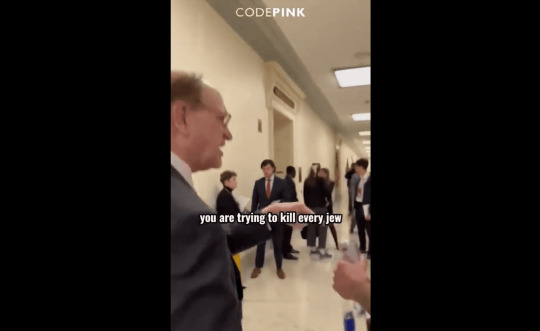
Protesters affiliated with the antiwar group Code Pink seek to ask Rep. Brad Sherman about his support for the massacres of Palestinians in Gaza, in a video posted March 20, 2024. The congressman from Los Angeles/Malibu ran away from the protesters and accused them of seeking the genocide of Jews. Screenshot.
Sherman accused them of antisemitism. “There’s blood on your hands for the genocide—you’re trying to kill every Jew.”
That is the chief refuge for Democrats who excuse Israel’s actions. To say that critics of genocide are motivated by antisemitism.
But even liberal media are giving a platform to progressive critics. “The United States is complicit in genocide,” Mehdi Hasan said this week on New York public radio, and when the host pushed back and said Hasan was not blaming Hamas, Hasan said of course he denounces Hamas, but his tax dollars are not going to support Hamas. He also pointed out the inevitable consequences of military occupation. “The oppressed will always rise against the oppressor.”
And in wonderful media news this week, Atlantic editor Jeffrey Goldberg withdrew from a speaking engagement in Kentucky after students questioned his record in the Israeli military nearly 40 years ago.
Jeffrey Goldberg, Editor-in-Chief of The Atlantic, withdrew from a scheduled speaking event at the University of Kentucky (UK) Wednesday, citing a last-minute schedule change, amidst concerns from students about his past as a former Israel Defense Forces (IDF) prison guard and his views on Zionism…. “We were informed that students expressed concern as to why a former IDF prison guard would be speaking on democracy and journalism at an event celebrating the integration of UK. Students were told he withdrew to not cause harm on campus,” the representative [of a Palestinian solidarity group] stated.
The event was billed as “The Future of Journalism and the Health of Our Democracy.” That’s a little bit of accountability. The editor of the Atlantic is finally being called out for his service for Israel. The writer Yakov Hirsch repeatedly explained on our site that Netanyahu could not have maintained his faultless reputation in the U.S. mainstream without Goldberg fostering “hasbara culture.”
And bear in mind, that Goldberg used to brag about his military service. He wrote a whole memoir about it. Now, times are changing. And other editors who carried water for Israel will surely be called on to defend that work.
This process is just beginning. Zionists still have esteem in the U.S. discourse. The view that Israel supporters promote bigotry against Palestinians is still off-limits. Even as mainstream Jewish organizations assert that those who support Palestinian rights are bigoted against Jews.
“Israel supporters should be seen as on the same moral level as supporters of Bull Connor, but in the U.S. and Western mainstream you can only point to antisemitism— you can never point to anti-Palestinian racism on the Israel side,” Donald Johnson has written on our site.
“We cannot make progress on this issue if the extreme racism of the pro-genocide side is never discussed. People have to be able to say that any group, whether white southerners or South Africans or Nation of Islam members or Christian evangelical Zionists or Germans or, yes, Jewish supporters of Israel, can be racists. They can make racism central to their ideology. But Zionist racism is still a taboo subject, automatically branded as antisemitic, because fundamentally Palestinians are seen as lesser.”
#gaza#israel#gaza strip#gazaunderattack#genocide#israel is a terrorist state#free gaza#free palestine#palestine#jerusalem#news#world news#breaking news#latest news#palestine news#war on gaza#war news#news update#support palestine#rafah#save rafah#free rafah#keep eyes on rafah#rafah under attack#all eyes on rafah#tel aviv#current events#yemen#al quds#khan younis
49 notes
·
View notes
Photo

On this day, 21 June 1964, three civil rights workers were murdered by police and Ku Klux Klan members in Mississippi. James Earl Chaney, a 21-year-old Black former union-plasterer and organiser with the Congress of Racial Equality (CORE) from nearby Meridian, Mississippi, Andrew Goodman (pictured bottom, left), a 20-year-old Jewish anthropology student from New York, and Michael 'Mickey' Schwerner, a 24-year-old Jewish CORE organiser and former social worker from New York were lynched on the night of June 21–22 by members of the Mississippi White Knights of the Ku Klux Klan, the Neshoba County's Sheriff Office and the Philadelphia Police Department located in Philadelphia, Mississippi. The three had been working on the "Freedom Summer" campaign, attempting to register Black people to vote. While seven of the killers ended up being jailed on federal charges of civil rights violations, the state of Mississippi didn't prosecute anyone for the murders until 2005, when they eventually charged one of the killers with manslaughter. He was then convicted and sentenced to 60 years imprisonment. Chaney's younger brother Ben later joined the Black Panther Party and the urban guerrilla group the Black Liberation Army, for which he ended up serving 13 years in prison. For this and hundreds of other stories, get hold of a copy of our first book: https://shop.workingclasshistory.com/products/working-class-history-everyday-acts-resistance-rebellion-book https://www.facebook.com/photo.php?fbid=648220290684523&set=a.602588028581083&type=3
180 notes
·
View notes
Text
instagram
The Sprawl Repair Initiative aims to replace sprawl with human-scaled density. Here’s a design by the firm of DPZ (Andres Duany & Elizabeth Plater-Zyberk) showing how a mall surrounded by acres of parking can become a town center, via infill mixed use apartments, a street grid overlay, green spaces, trees, and green roofs, and in this example, a circular canal; creating a pleasant space people actually want to be in.
cc: @cnu-newurbanism
#urbanism#architecture#dpz#andres duany#elizabeth plater-zyberk#congress for the new urbanism#Instagram
6 notes
·
View notes
Text
Keeping the African American vote “diluted” so they have no political power. This is what racist RepubliKKKans do.
If your vote didn’t matter, they wouldn’t be spending billions to prevent you from voting.
If you think they are only against black people you are mistaken. Yes I’m going to list their targets again; women, blacks, anyone else that isn’t 100% white, lgbt, the poor, the elderly, unionized labor, the educated, urban dwellers, the handicapped, veterans, northerners, east coasters, west coasters, Catholics, Jews, Muslims, atheists, agnostics, anyone who isn’t an evangelical or Protestant, liberals, liberal Protestants, Hispanics (unless they’re the white fascist variety), Asians, Africans, Pacific Islanders, Eastern European whites, southern European whites, olive skinned whites, Democrats, social democrats, progressives, celebrities, immigrants (even the white ones), truth tellers,…
It’s a long list and overlaps in many places. Theirs is a rarified world consisting of the wealthy, their useful idiots, their henchmen, and their foot soldiers. Poor whites exist to be exploited labor and consumers as long as they can remain healthy enough to work. Everyone else is to be “eradicated” and yes they are using that word openly now, and not just by Marjorie Trailer Queen.
Followers sometimes tell me I’m too harsh on RepubliKKKans but that’s only because they want to eradicate me and most of you. These are literal neo-Nazis and neo-Confederates. Recent history has already shown that you can not take the high road with Nazis. To them courtesy and respect are signs of weakness and represent victims. They are heavily armed and clamoring for a fight. Everyday their fascist bully boys and radicalized assassins slaughter us in public. The police, military, and even the SCOTUS, have been infiltrated by white supremacists as have local, state, and government agencies. Each passing day shows us their literal plans to steal our democracy, our rights, and our lives. If they win the presidency and Congress again it’s game over for us.
You must do everything you can to elect Democrats and block the RepubliKKKan agenda. Vote, register others to vote, donate if you can, organize and spread the message, and protest publicly if you are able. These steps will be much easier than battling AR-15 armed militias in the street.
99 notes
·
View notes
Text
By Lynn Paramore, Institute for New Economic Thinking
Common Dreams
May 15, 2024
Shameful fact: the plight of U.S. retirees is a global exception. In their pursuit of lower taxes, America’s wealthiest individuals support policies that make it extremely difficult for seniors to manage the increasing costs of healthcare, housing, and basic necessities. Not so in other rich countries like Germany, France, and Canada, where robust public pensions and healthcare systems offer retirees stability and dignity. After a lifetime of hard work, older citizens in the U.S. find their reward is merely scraping by, as savings diminish under the weight of soaring medical costs in the most expensive healthcare system in the developed world.
The solution from America’s elites? Suck it up and work longer.
An example of this mindset appeared in a New York Times op-ed by C. Eugene Steuerle of the Urban-Brookings Tax Policy Center and Glenn Kramon, a Stanford Business School lecturer. The two accused older folks of robbing economic resources from the young through Social Security and Medicare—never mind that workers fund these programs with their own lifelong payroll contributions. They paint a picture of 65-year-old Americans jauntily playing “pickleball daily” and jet-setting “far and wide,” proposing to increase the age to collect Social Security and Medicare benefits, essentially forcing future retirees to work longer. (Curiously, they overlook how this move robs young people—too young to vote—of future retirement years. This echoes 1983, when the Reagan administration and Congress pushed the Social Security age from 65 to 67, impacting Gen X before they could even vote on it).
Steuerle and Kramon prop up their plan with studies that extol the health and wellbeing perks of working into old age, adding that “each generation lives longer” and therefore, it’s a patriotic duty for the elderly to stay on the job.
Are we all really living longer? Let’s first point out that Princeton economists Anne Case and Angus Deaton, noted for their research in health and economics, recently showed that many Americans are not, in fact, enjoying extended lives. As they stated in their own New York Times op-ed, those without college degrees are “scarred by death and a staggeringly shorter life span.” According to their investigation, the expected lifespan for this group has been falling since 2010. By 2021, people without college degrees were expected to live to about 75, nearly 8.5 years shorter than their college-educated counterparts.
Overall life expectancy in America dropped in 2020 and 2021, with increases in mortality across the leading causes of death and among all ages, not just due to COVID-19. In August 2022, data confirmed that Americans are dying younger across all demographics. Again, the U.S. is an outlier. It was one of two developed countries where life expectancy did not bounce back in the second year of the pandemic.
So the argument that everyone is living longer greatly stretches the truth—unless, of course, you happen to be rich: A Harvard study revealed that the wealthiest Americans enjoy a life expectancy over a decade longer than their poorest counterparts.
Could the idea that working into our seventies and beyond boosts our health and well-being hold true? Obviously, for those in physically demanding roles, such as construction or mining, prolonged work is likely to lead to a higher risk of injury, accidents, and wearing down health-wise. But what about everybody else? What if you have a desk job? Wouldn’t it be great to get out there, do something meaningful, and interact with people, too?
Perhaps it’s easy for people like Steuerle and Kramon to imagine older people working in secure, dignified positions that might offer health benefits into old age – after all, those are the types of positions they know best.
But the reality is different. Economist Teresa Ghilarducci, a professor at the New School for Social Research, focuses on the economic security of older workers and flaws in U.S. retirement systems in her new book, Work, Retire, Repeat: The Uncertainty of Retirement in the New Economy. She calls those praising the health perks of working longer “oddballs” – those fortunate folks in cushy positions who have a lot of autonomy and purpose. Like lawmakers or tenured professors, for example.
She points out that academic researchers often base their theories about the benefits of working longer on a hypothetical person who just tacked on a few extra years in the same position, noting that researchers often make the faulty assumption that people are not only living longer, but can also easily choose to work longer, keep their jobs without facing pay cuts, and continue stacking up savings into later life.
That’s not really how it plays out in real life for most folks. Ghilarducci found that most people don’t actually get to decide when they retire, noting that “the verb ‘retire’ isn’t a verb that really belongs to the agency of the worker – it’s the employers’ choice.” Retirement often means somebody above you telling you it’s time to go. You’re ousted—laid off or pushed out because your productivity’s slipping or your skills are aging like last year’s tech. Or simply because of biases against older workers. Age discrimination is a huge issue, with two-thirds of job seekers aged 45 to 74 reporting it. In fact, people trying to find a job say they encounter significant biases as early as age 35. For the high-tech and entertainment industries, this is particularly true.
So there’s that.
There’s also the fact that continuing to work in an unfulfilling job might be hazardous to your health. The reality is, a lot of us are grinding in jobs that are stressful and insecure, and that constant stress ties into a whole host of health issues — hypertension, heart problems, messed up digestion, and a weaker immune system, not to mention it can kickstart or worsen mental health troubles like depression and anxiety.
Many are stuck in what anthropologist David Graeber memorably dubbed “bullshit jobs” — roles that feel meaningless and draining. Graeber described these jobs as a form of ‘spiritual violence,’ and found them linked to heightened anxiety, depression, and overall misery among workers. His research found strong evidence that seeing your job as useless deeply impacts your psychological well-being.
The link between job dissatisfaction and poor health has been found to be significant in study after study. Unrewarding work can demotivate people from staying active, eating well, or sleeping regularly, potentially leading to obesity, type 2 diabetes, and other health issues. In contrast, retiring from such a job could free up time and energy for wellness activities, enjoyable hobbies, and a healthier lifestyle overall.
Ghilarducci points out that reward-to-effort ratios, crucial for job satisfaction, are declining due to factors like stagnant real wages. She also highlights the problem of subordination, explaining that it can be “lethal” to remain in a job where you lack control over the content or pace of your work. According to her, such factors can lead to higher morbidity and lower mortality rates.
Okay, what about social engagement? That’s crucial for seniors, right? True, but demanding or unfulfilling jobs can make it hard to find the time and energy to socialize, leading to isolation and loneliness, which are major factors in declining mental health and quality of life for the elderly.
Also, when talking about delaying retirement, we can’t ignore cognitive decline. Sure, working longer might keep your mind sharp if the job is stimulating. However, research indicates the opposite for dull jobs. Florida State University researchers found that not only can tedious work accelerate cognitive decline, leading to increased stress and reduced life satisfaction, but “dirty” work does as well. They show that jobs in unclean environments with exposure to chemicals, mold, lead, or loud noises significantly impact brain health as we age.
Even university professors can suffer the effects of dirty jobs: North Carolina State University has recently come under fire for knowingly keeping faculty and staff working for decades in a building contaminated with PCBs, resulting in dire health consequences, including nearly 200 cases of cancer among those exposed.
Finally, it’s not a coincidence that those talking about raising the age for Social Security and Medicare are usually white men. They would suffer less from it than women, especially women of color. Women typically outlive men but earn less over their lifetimes, which already means smaller Social Security checks. It’s even tougher for Black women who often earn way less than their white peers and are more likely to have unstable jobs with skimpy benefits. Plus, women frequently take breaks from their careers for caregiving, shaving off years of paid work and further slicing their Social Security benefits. Pushing the retirement age higher forces women, especially Black women, to either toil longer in poor-quality jobs or retire without enough funds, making them more vulnerable to poverty and health problems as they get older.
Ghilarducci observes that for women in low-paying jobs with little control and agency, “working longer can really hasten their death, and the flip side of that is that retirement for these women really helps them.”
Bottom line: The whole “work longer, live healthier” spiel doesn’t fly for most. In the U.S., the well-off might be milking the joys of extended careers, but lower-income folks, particularly women and people of color, often endure the slog of thankless jobs that negatively impact their health and well-being. Elites shout from their comfortable positions that we need to push retirement further back as if it’s the magic fix to all economic woes. But when such people fantasize about happy seniors thriving at work, they’re missing the harsh reality many face—painful, boring, insecure jobs that speed death.
The myth that we’re all living longer and healthier is just that—a myth belied by life expectancy stats showing not everyone’s in the same boat. What America desperately needs is a beefed-up, fair Social Security and Medicare system that serves all Americans, not just the ones who can afford to retire without a worry. No one should be stuck choosing between a crappy job and retiring into penury.
Yet Republicans are on the warpath against Social Security and Medicare. Senator Mike Lee has explicitly stated his goal to completely eliminate Social Security, aiming to “pull it up by the roots, and get rid of it.” His fellow Republicans are enthusiastically getting the ball rolling: House Republicans have released a new proposal to weaken Social Security by raising the retirement age. For his part, former and possible future president Donald Trump indicates a willingness to consider cuts to Medicare and Social Security, despite previously criticizing his primary rivals on the issue, who were almost wall to wall demanding drastic cutbacks.
Democratic lawmakers typically show more support for Social Security and Medicare in public, though their track record has not fully alleviated concerns about the present and future vulnerability of these programs. In his recent State of the Union speech, President Biden advocated for the expansion and enhancement of Social Security and Medicare, declaring that “If anyone here tries to cut Social Security or Medicare or raise the retirement age, I will stop them!” But it’s important to keep in mind that he supported raising the retirement age during the 1980s and again in 2005.
Polling shows that voters, whether Democrats or Republicans, do not want to cut these programs. Actually, they want to expand Social Security and Medicare. That’s because those who face the realities of daily life understand that working endlessly is a cruel and unreasonable – not to mention unhealthy — expectation that no society should endorse. The idea that America can’t afford to do this is outlandish when the evidence is so clear that American billionaires pay historically low tax rates that are now lower than those for ordinary workers. What America can’t afford is the super-wealthy and their paid representatives working the rest of us to death.
21 notes
·
View notes
Text
Join us for CNU 31 in Charlotte, NC!

The Congress for the New Urbanism is thrilled to bring our 31st annual Congress to one of the most diverse, vibrant cities in the American Southeast with deep roots in new urbanism – the Queen City of Charlotte, North Carolina.
Charlotte is a city that is on the move, aggressively working to address economic mobility and affordable housing with public-private partnerships and new regulatory tools. With the recent adoption of the Charlotte Future 2040 Comprehensive Plan, CNU 31's host city is ready for implementation and action - one of the great skills of New Urbanists.
Early Bird registration closes April 7 so register now!
#new urbanism#urbanism#congress#conference#corridors#charlotte#north carolina#clt#queen city#design#planning#urban design#urban planning#transit
0 notes
Text


For all the time Republicans spend complaining about the economic struggles faced by everyday Americans, they remain steadfast in their commitment to ensuring major corporations can continue squeezing their customers.
Late Wednesday afternoon, the GOP-controlled House Financial Services Committee voted to advance a bill that would repeal a new Consumer Financial Protection Bureau (CFPB) rule that drastically reduces the caps on credit card late fees - from $30-$41 to $8.
The legislation would also repeal the CFPB's ban on automatic adjustment of late fees due to inflation. In the Democratic-controlled Senate, where the bill is expected to fail, a similar repeal measure was introduced by Banking, Housing, and Urban Affairs Committee Ranking Member Tim Scott (R-S.C.) — who has recently devoted most of his energy to fawning over Donald Trump — and co-sponsored by 12 other Republicans.
“Credit card companies penalize consumers with exorbitant late fees that far exceed their actual costs, raking in billions of dollars in profits on the backs of those who can least afford it,” said Chuck Bell, advocacy program director for Consumer Reports, in a statement urging Congress to reject the repeal.
According to Republicans on the committee, however, lowering late fees will “harm consumers by shifting costs to responsible consumers who pay on time in the form of higher annual fees and higher interest rates,” while removing incentives for timely payments.”
An analysis published this week by the watchdog group Accountable.US found that Republicans on the committee have “received over $7.9 million from industry groups against this rule and the largest credit issuers.”
(continue reading)
#politics#republicans#tim scott#late fees#credit cards#credit card late fees#banking#the cruelty is the point#house financial services committee#bank fees#all skinfolk aint kin folk#vote da bums out
33 notes
·
View notes